Samuel “Rocky” Rojas, 41, was facing criminal charges of drug possession with intent to deliver, identity theft, fraud and absconding when a door opened to a new life for him.
He had spent years in the streets, using and selling drugs with his father, Samuel Rojas Sr.
“He was always around,” Rojas said of his father. “It was not like the prettiest, you know what I mean?”
Rojas was sitting in the Yakima County jail facing a possible 10-year sentence when he got a shot at redemption.

Samuel “Rocky” Rojas looks toward friends and family while reading a statement as he graduates from drug court in Yakima County Superior Court Tuesday, May 23, 2023, in Yakima, Wash.
The pills he was caught with didn’t contain opioids and the intent to deliver charge was dropped as a result.
That allowed him to enter Yakima County’s Drug Court, an 18-month program requiring offenders to undergo substance abuse treatment, attend 12-step self-help meetings, regularly report to court and stay clean and sober.
Offenders who successfully complete the program have their charges dismissed with prejudice, meaning they cannot be refiled.
On Tuesday, Rojas stood in a crowded courtroom and read a letter to the court. In the letter, he thanked all those who supported him – the courts, treatment service staff and others in recovery. He apologized to his children, Anthony, 24, and 13-year-old Serene.
“I’m sorry I haven’t always been there for you and our family,” he read from the letter. “I got my life back.”
Yakima County Superior Court Judge Elisabeth Tutsch signed his graduation certificate and tore up his felony charges.

Judge Elisabeth Tutsch, left, congratulates and hands Samuel “Rocky” Rojas a certificate for graduating from drug court Tuesday, May 23, 2023, in Yakima, Wash.
Cheers and applause from family, friends and others in the program filled the courtroom as a smile beamed across Rojas’ face.
“This program is just an awesome thing – it’s just an awesome thing,” he said.
Rojas is among 357 people who have graduated from drug court since its inception in 2000. Currently, the program has 63 active participants.
Drugs are the No. 1 driver of crime in the county, said Yakima County Prosecutor Joe Brusic. Drugs are contributing factors in domestic violence and homelessness and are tied to mental health problems.
Drug court was established to cut down on recidivism in the courts and jail and help offenders build a new life without drugs.
Brusic said Yakima County has one of the best drug court programs around -- one that has helped pull people from a seemingly hopeless fate.
“I have seen it save some lives that otherwise wouldn’t have been saved,” he said. “They’re either going to be in prison for a long time or they are going to die. It changes their lives.”

Samuel “Rocky” Rojas, right, eats cookies and shares a laugh with his dad Samuel Rojas Sr., left, after graduating from drug court Tuesday, May 23, 2023, in Yakima, Wash. Rojas Sr. recently graduated from mental health court.
Rojas isn’t the only one in his family to graduate a therapeutical court program. His father, Rojas Sr., graduated from mental health court last October and has been clean and sober more than three years now.
“I wanted to do good, and I wanted to do good for my family,” Rojas Sr. said outside the Yakima County Courthouse the day his son graduated drug court.
New beginning
A life of using, especially with your father, isn’t pleasant, Rojas said.
When his parents divorced, his father – who always worked hard – fell into drug use, Rojas said, explaining that he had already been running the streets and dealing drugs.
“I couldn’t stand him,” Rojas said of his father. “It was like I was upset with him for what he was doing but I was doing the same thing.
“My dad’s a different person today. We respect each other, we’re proud of each other.”
Rojas had spent about 15 months in county jail while his father spent a year before either was accepted into a therapeutic court program.
Rojas Sr. had charges of felony burglary, malicious mischief and providing false statements dismissed with prejudice. He had completed mental health court “with great success,” said the document dismissing his charges.
Rojas Sr. said his life is much better now.
“Staying good, staying clean, living a happy life,” he said. “It’s worth it, mental health court and everything. If you really want it – it’s worth it.”
A God thing
Rojas said he was sitting in a jail cell when he had a feeling the pills he was caught with may not have contained any illicit drugs. He asked his defense attorney to send them off to a lab for testing.
That’s when he learned that his drug supplier had burned him – a blessing in disguise.
With the intent to deliver charge dropped, Rojas became a candidate for drug court.
At that point, drug court didn’t seem a good option to him now that his possible sentence would drop to less than 40 months, he said.
“I thought, let’s just plea out to what I got, ride the bus to prison and get out in a couple of months,” Rojas said.
But his defense attorney was insistent that he give drug court a try.
“She was awesome,” he said. “So I said, ‘yeah, put in the request.’ ”
He was released from jail and half-heartedly entered drug court.
“I was still kind of thinking the get-out-of-jail card,” Rojas said.
He got a job at an auto dealership and was accepted into a clean and sober house.
“Everything began to fall in place,” he said.
Then he relapsed, missed work and was kicked out of his recovery house.
Rojas spent the night in his truck and another night at a friend’s.
“After having 500 days under your belt and then you have a relapse, it’s a downward spiral and you lose everything,” he said.
Rojas said he was honest with his boss when he called, and he was given a second chance. He also was honest with the house manager at the clean and sober house and was voted back in.
And he was honest with the court and was able to stay in the program.
“No one gave up on me,” he said. “I’m telling you, all this is the grace of God, for all this happening.”
A different kind of court
Drug court is unlike any other. Cheers and applause abound when a participant shares how long they’ve remained clean and sober.
Participants pull together, supporting and encouraging one another. Unbreakable bonds are formed, said therapeutical courts coordinator Sara Heitman.

Samuel “Rocky” Rojas, center, thanks his friends Jim Castilla, left, and Matthew Lewis, right, for coming to his drug court graduation Tuesday, May 23, 2023, in Yakima, Wash.
“There’s a lot of hope,” she said. “And in addiction, there is absolutely no hope. The participants, for a lot of them, there was no hope.”
Heitman said participants are quick to tell you the one thing helps them succeed in the program.
“It’s the camaraderie,” Heitman said. “It’s the support from others sitting in the same groups, in the same meetings. That is what helps the most.”
She said participants have formed a softball league and other activities together. Most important, they recognize when someone in the group is struggling.
“That’s pretty special,” she said.
Rojas said support is what saved him after his relapse.
“From then on I started reaching out to everyone,” he said. “The way the program is – it’s cool. Everyone is comfortable, everyone is supportive. It works.”
But the court isn’t easy and there are consequences when participants do not take the program seriously, Heitman said.
If participants hang out with people they shouldn’t, don’t attend required meetings or fail to show up for court, they face sanctions, which could include a day of community service, or working on a Department of Corrections work crew, or spending a day in court listening to criminal cases and writing a report about what they observed, Heitman said.
The sanctions are meant to hold participants accountable but not intended to drive them out of the program, she said.
“It’s so different from the typical court setting,” she said.
A new vision
Rojas is spending more time with his children now and has lots of support from his girlfriend, Desi Koonrad.
They each chair 12-step recovery meetings weekly and help organize recover events such as volleyball games and barbecues.
“She’s been a major part of my recovery,” he said. “We just support each other. It’s a good support system – it’s working.”

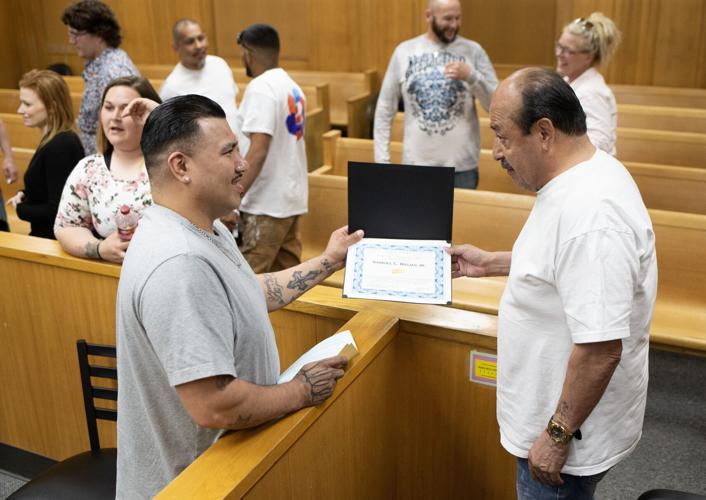
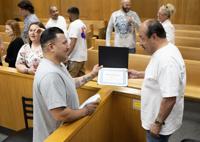
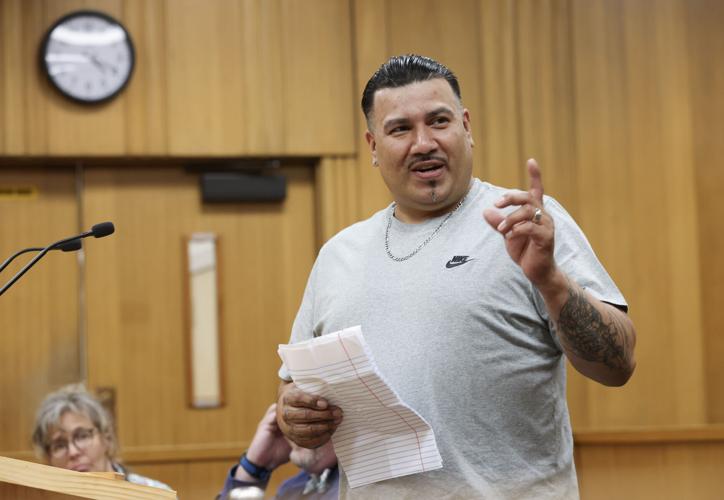
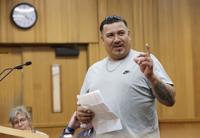

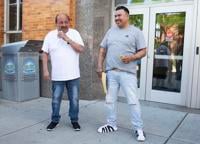

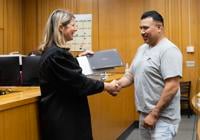


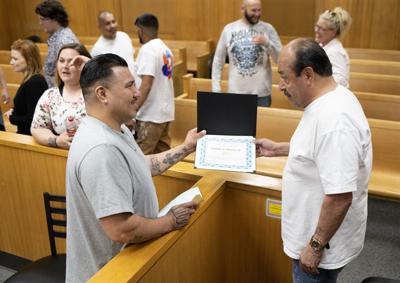






(0) comments
Comments are now closed on this article.
Comments can only be made on article within the first 3 days of publication.